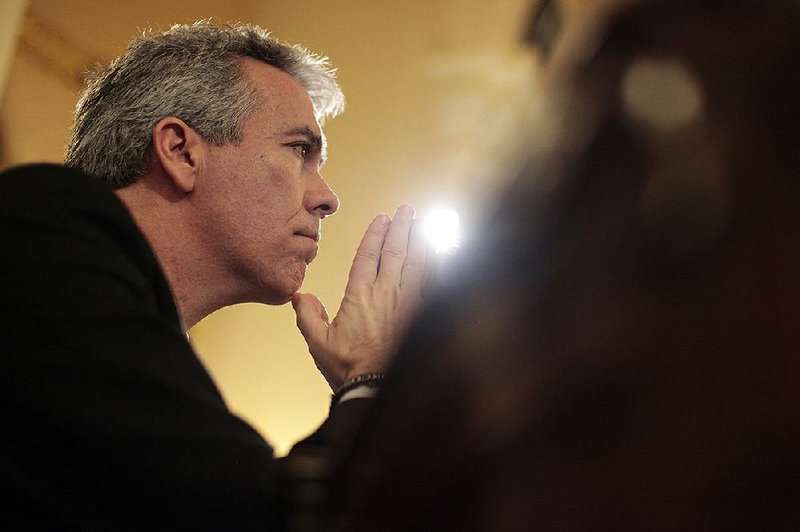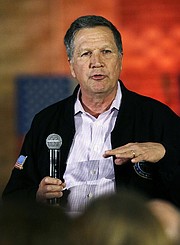WASHINGTON -- Joe Walsh, a former congressman, is preparing a Republican primary challenge to President Donald Trump that he previewed as a daily "bar fight" with the incumbent over his morality and competency.
Mark Sanford, a former South Carolina governor and congressman, said he is inching closer to a bid of his own by sounding out activists in New Hampshire and other early-voting states about a challenge focused on the ballooning deficit.
Jeff Flake, a former Arizona senator, said he has taken a flurry of recruitment calls in recent days from GOP donors rattled by signs of an economic slowdown and hungry for an alternative to Trump.
And former Ohio Gov. John Kasich will head to New Hampshire next month to "take a look at things" after experiencing "an increase" in overtures this summer, an adviser said.
The anti-Trump movement inside the Republican Party is feeling new urgency to mount a credible opposition to Trump before it's too late. With state deadlines for nominating contests approaching in the fall, potential candidates face pressure to decide on running within the next few weeks. So far, only former Massachusetts Gov. Bill Weld has declared that he is running, but he has struggled to gain traction.
Republicans considering bids acknowledge that defeating Trump appears to be nearly impossible but argue that a recession or an unforeseen change in the political climate could weaken him enough to make a primary challenge more feasible.
"Anybody who says, 'I think I can beat Donald Trump,' I think is stretching it," Sanford said. "It's a daunting task and it is indeed preposterous at many different levels."
But Sanford said he recently returned from a trip to New Hampshire and is leaning toward jumping in -- "another 'green light on go' versus 'no go'" -- and figures he "could win without winning."
"If [Trump] gives you a nickname and has surrogates rough you up, you could get a message out and create a national conversation on what it means to be a Republican these days and that could probably be worth the endeavor," Sanford said.
Money will be an immense hurdle. Trump and the affiliated committees raising money for his re-election bid reported collecting $105 million in April, May and June, shattering quarterly records. Many traditional Republican donors already are backing Trump, but anti-Trump organizers are courting wealthy independents or even liberals to contribute in the GOP primary, if only to bruise the president and help the eventual Democratic nominee in the general election.
Trump's advisers and allies have dismissed the efforts as plotting by a bloc that has lost relevance in the GOP.
"It's a free country and people are allowed to have hobbies," former House Speaker Newt Gingrich said when asked about the primary bustle.
Inside the White House, neither Trump nor his team consider Weld or the prospective candidates to be serious threats because there has been no evidence of a groundswell of grass-roots support behind them.
"There's no discussion of any of them or any of that," said Kellyanne Conway, counselor to the president. "None of them even has risen to the level of a nickname."
The Republican National Committee is using aggressive measures to stave off any possible primary tussle. Committee members passed a resolution this year giving Trump the party's "undivided support" and effectively merged with Trump's campaign.
But that hasn't stopped anti-Trump Republicans from scrambling to map out potential campaigns.
Walsh, now a talk-radio host, said he voted for Trump in 2016 but concluded after Trump declined in Helsinki last year to confront Russian President Vladimir Putin over election interference that he was "fundamentally unfit" for the office. He said he is huddling this week with potential supporters and is leaning toward announcing a campaign next month.
Referring to Trump, he said: "He's a bully and he's a coward. Somebody's got to punch him in the face every single day."
Walsh was elected to the House from Illinois in 2010 as part of the tea party wave and served one term. He described himself as an immigration hard-liner and said he would not challenge Trump from the center but from the right and on moral grounds.
Sanford is taking a different tact. He said that the case against Trump over morality, decency and corruption already is being made by other conservative commentators, so his prospective candidacy would fixate almost entirely on Trump's deficit spending.
"We really are at a financial tipping point the likes of which we haven't seen in a very long time," Sanford said. "Unless we constructively engage this issue, which is not being done, I think the financial markets will do it for us, and historically that process has been bloody for regular, working, everyday Americans."
Information for this article was contributed by Emily Guskin of The Washington Post.
A Section on 08/22/2019

